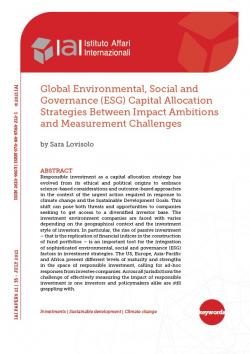Global Environmental, Social and Governance (ESG) Capital Allocation Strategies Between Impact Ambitions and Measurement Challenges
Responsible investment as a capital allocation strategy has evolved from its ethical and political origins to embrace science-based considerations and outcome-based approaches in the context of the urgent action required in response to climate change and the Sustainable Development Goals. This shift can pose both threats and opportunities to companies seeking to get access to a diversified investor base. The investment environment companies are faced with varies depending on the geographical context and the investment style of investors. In particular, the rise of passive investment – that is the replication of financial indices in the construction of fund portfolios – is an important tool for the integration of sophisticated environmental, social and governance (ESG) factors in investment strategies. The US, Europe, Asia-Pacific and Africa present different levels of maturity and strengths in the space of responsible investment, calling for ad-hoc responses from investee companies. Across all jurisdictions the challenge of effectively measuring the impact of responsible investment is one investors and policymakers alike are still grappling with.
Paper prepared in the framework of the IAI-Eni Strategic Partnership, July 2021.
-
Details
Rome, IAI, July 2021, 40 p. -
In:
-
Issue
21|35 -
ISBN/ISSN/DOI:
978-88-9368-212-1
1. Evolving definitions of sustainable investment in the asset management and banking industry: Looking for outcomes?
1.1 The Paris Agreement and the quest for an alignment on greenhouse gas emission reduction
1.2 The Sustainable Development Goals: How to measure impact
1.3 The risk approach to ESG integration
2. Opportunities and threats from the ESG investing movement for the energy industry in Europe, US, APAC and MEA
2.1 Europe: Closing the loop on sustainable finance, from EU Taxonomy to retail investment
2.2 US: Catching up to de-risk the financial system
2.3 China’s awakening to climate-related risks: Leapfrogging to mandatory climate disclosures and allocation
2.4 India: The race to renewables and nascent ESG investment approaches
2.5 Africa – Investing for impact
3. Passive investment focus: Smart ESG indexes and engagement strategies
3.1 Index design methodologies for gradually enhancing allocation towards sustainable assets
3.2 Stewardship in passive investment strategies: Which theory of change?
4. The challenge for private ESG assets: High impact versus limited comparability
4.1 Impact strategies mostly target private (unlisted) assets
4.2 The challenges of impact measurement
Conclusion: The long journey to effective ESG impact measurement
References
Topic
Tag
Related content
-
Ricerca02/11/2018
IAI-Eni Strategic Partnership
leggi tutto



